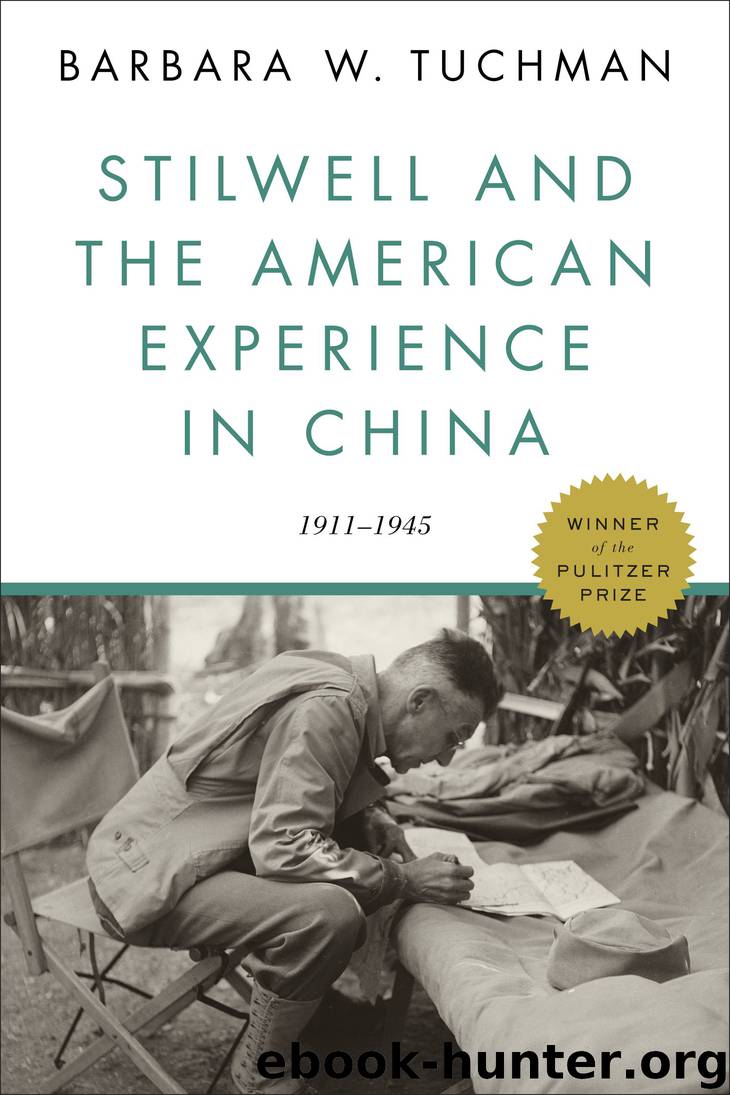Stilwell and the American Experience in China by Barbara W. Tuchman

Author:Barbara W. Tuchman
Language: eng
Format: epub
Publisher: Random House Publishing Group
Published: 2017-01-23T16:00:00+00:00
* * *
*1 The military habit of giving code names to people and projects partly accounts for the prevalence if not the nature of the nicknames Stilwell used.
*2 The wording was that of the American Naval Attaché, Colonel James McHugh, who was on close personal terms with Chiang and Madame and often served as mouthpiece for their views.
*3 For route of the walkout, see map on this page.
12
The Client June–October 1942
THE LOSS OF BURMA, completing the blockade of China, raised the fear in American minds that China’s will to resist would not survive her isolation. She clearly required encouragement in the form of tangible support. The question was how to deliver it. With the Japanese in Myitkyina forcing the flight northward, the air transport route was aggravated in danger and difficulty. Priorities in any case were assigned to Europe. Strategy in Asia was still uncertain. All that could be envisaged so far was the necessity of keeping China in the war as a base for air operations against Japan’s sea-lanes and ultimate springboard for invasion. “Keeping China in the War,” the title of a War Department plan at this time, meant in effect sending her enough supplies to keep her operational, and that meant in effect the reconquest of Burma.
Stilwell had a plan for the reconquest ready to commit to paper by the time he reached Delhi. Inevitably, after his experience in Burma, it called for American divisions. “My belief in decisive strategic importance of China is so strong,” he wired the War Department on May 25, “that I feel certain a serious mistake is being made in not sending American combat units into this theater.” Marshall could not be persuaded to divert any strength from full commitment to a Second Front in Europe. All he could offer was to return the Tenth Air Force to Stilwell’s command. The outlook for CBI was not encouraging and made Stilwell more than ever determined to carry out his project for training a Chinese task force in India.
He had little support. The miasma of defeat and the sense of being in a low-priority theater had permeated many of the Americans on duty in CBI. One after another of the staff in Delhi asked to be relieved, some pleading illness, some ambitious for a more promising assignment. “Christ, isn’t there one of them that puts the war first and himself second?” Stilwell himself was suffering from jaundice contracted from defective yellow fever serum, but though feeling “weak as a rag” and confined to bed off and on for the next several weeks, his idea of duty allowed him little sympathy for anyone who wanted relief. Stilwell could not understand a soldier who did not put duty to the mission first. He had “an exalted concept of true soldiering and an impossible ideal of what a true soldier should be,” wrote the journalist Eric Sevareid after serving in CBI.
After conferring with Wavell who “mumbled” an assurance, “WILL go back for Burma,” Stilwell departed for Chungking, arriving on June 3 after a five-day stopover in Kunming because of bad weather.
Download
This site does not store any files on its server. We only index and link to content provided by other sites. Please contact the content providers to delete copyright contents if any and email us, we'll remove relevant links or contents immediately.
| Africa | Americas |
| Arctic & Antarctica | Asia |
| Australia & Oceania | Europe |
| Middle East | Russia |
| United States | World |
| Ancient Civilizations | Military |
| Historical Study & Educational Resources |
The Sympathizer by Viet Thanh Nguyen(4371)
The Rape of Nanking by Iris Chang(4190)
World without end by Ken Follett(3457)
Ants Among Elephants by Sujatha Gidla(3450)
Blood and Sand by Alex Von Tunzelmann(3181)
Japanese Design by Patricia J. Graham(3153)
The Queen of Nothing by Holly Black(2574)
City of Djinns: a year in Delhi by William Dalrymple(2542)
Foreign Devils on the Silk Road: The Search for the Lost Treasures of Central Asia by Peter Hopkirk(2451)
India's Ancient Past by R.S. Sharma(2438)
Inglorious Empire by Shashi Tharoor(2424)
Tokyo by Rob Goss(2419)
In Order to Live: A North Korean Girl's Journey to Freedom by Yeonmi Park(2371)
Tokyo Geek's Guide: Manga, Anime, Gaming, Cosplay, Toys, Idols & More - The Ultimate Guide to Japan's Otaku Culture by Simone Gianni(2354)
India's biggest cover-up by Dhar Anuj(2342)
The Great Game: On Secret Service in High Asia by Peter Hopkirk(2325)
Goodbye Madame Butterfly(2241)
Batik by Rudolf Smend(2169)
Living Silence in Burma by Christina Fink(2052)
